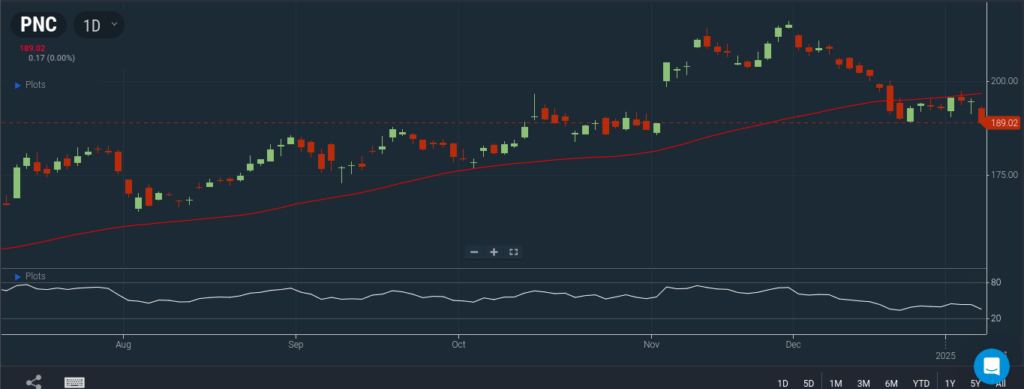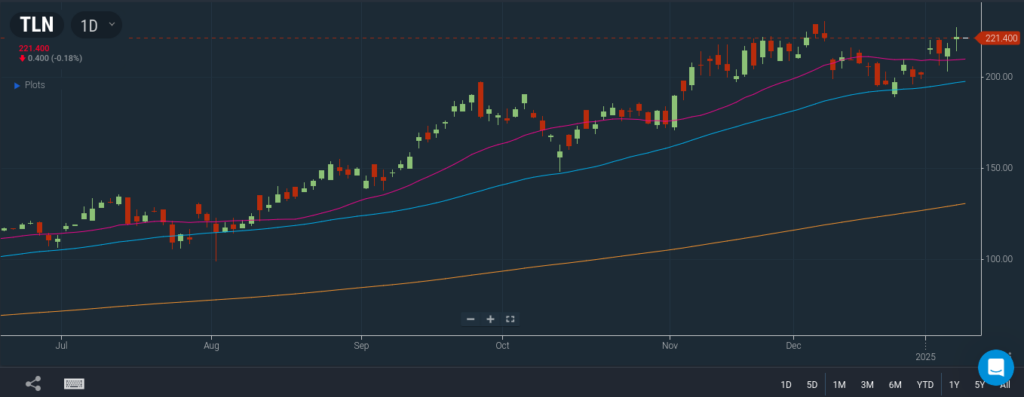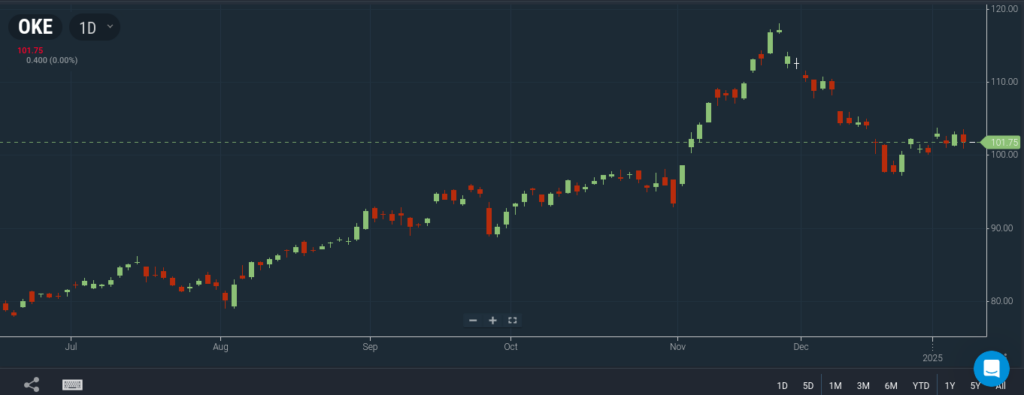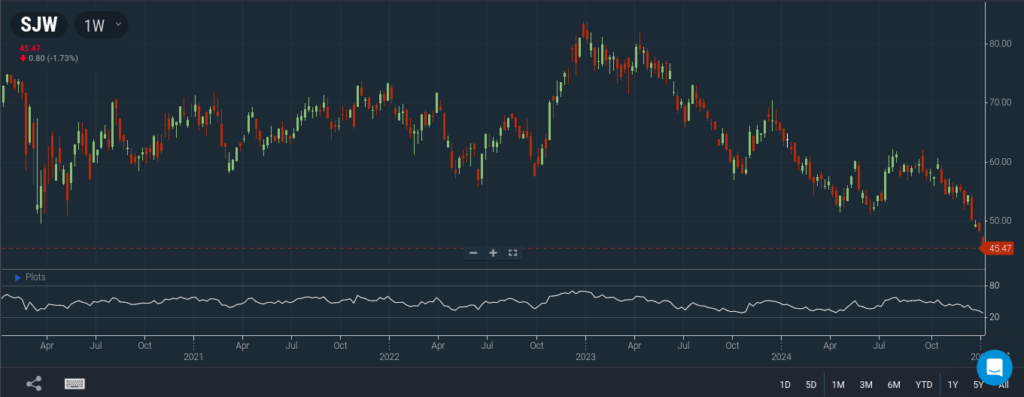Zinger Key Points
- Hotter than expected job market suggests Fed will slow down interest rate cuts
- Inflation remains sticky, and mortgage rates are inching up
- But some stocks benefit from "higher for longer" interest rates
- Feel unsure about the market’s next move? Copy trade alerts from Matt Maley—a Wall Street veteran who consistently finds profits in volatile markets. Claim your 7-Day free trial now.
Markets tumbled this week as a number of factors came into focus, pointing toward rates that would remain higher for longer. A hot jobs report sent stocks plummeting as the economy added 256,000 jobs vs 155,000 expected, dampening the prospects of multiple rate cuts in 2025.
The Federal Reserve had already begun tempering expectations for future reductions by highlighting the stickiness of last-mile inflation and the uncertainty of how tariffs will affect the economy. On Friday, the average 30-year fixed mortgage rate hit 7.24%, the highest reading in over a year and another signal that compounding factors continue to influence higher rates.
Here are the four stocks that will benefit from higher interest rates.
Higher for longer now appears to be the prevailing mantra, and how the economy responds to sustained 7% mortgage rates, aggressive tariffs, and a hot job market is anyone's guess. Higher rates aren't necessarily bad news for everyone. For savers or retirees on fixed incomes, higher rates mean better yields on low-risk assets like savings accounts and money market accounts.
But if you're looking for a house right now (or trying to originate mortgage loans), high prices and 7% mortgage rates are a deep hindrance.
Investors also face difficult choices in ‘higher for longer' environments. High rate environments can be a drag on stocks, especially in debt-heavy sectors. Tech stocks have managed to outperform despite high rates until now, but big winners like NVDA and MSFT have struggled of late.
If rates remain higher than expected, investors must adjust their expectations and not fight the new trend. Specific sectors like utilities and finance are often safe havens in high-rate environments, as are value stocks and dividend payers. Today, we'll look at four stocks that could boost your portfolio if rates stay higher for longer.
PNC Financial Services Group PNC
Banks are often the first place to turn when rates are high for prolonged periods. While banks are forced to pay higher interest on deposits through FDIC-insured vehicles like savings accounts and CDs, they can also charge borrowers higher rates for mortgages, personal and business loans, credit instruments, and more. If mortgages and credit card interest rates stay elevated, PNC could be one of the beneficiaries.

PNC Financial Services Group is one of the largest regional banks in the United States, with operations focused primarily on the northeast United States. Based out of Pittsburgh, PNC offers consumer and commercial banking services, along with wealth management, insurance, mortgages, and private equity.
One area where PNC stands out is small business; the firm is a top 5 regional bank for small business in terms of banking relationships and Small Business Administration (SBA) loan origination. PNC has also worked to reduce its exposure to commercial real estate loans, an area that has seen a recent uptick in delinquencies.
PNC shares performed well in 2024, but a recent dip below the 50-day moving average has turned a previous support level into resistance. However, the RSI shows an oversold stock and deregulation tailwinds could reignite the upward trend. PNC is currently rated a consensus Buy based on 25 analyst reports with an average price target of $195, representing a 24% upside from current levels.
Talen Energy Corporation TLN
Utilities are usually anathema to active investors because they are boring, highly regulated, offer minimal returns, and are frequently affected by disasters like hurricanes and wildfires. However, over the last six months, utilities have actually outperformed the rest of the market (10% gain versus 3% for the S&P 500), and independent power producers like Talen Energy have been among the sector's biggest winners.

Talen Energy is a Houston-based power company selling electricity services through multiple divisions, including both fossil fuels and renewable energy sources. The company operates nuclear, gas, and coal power plants in the northeastern United States and Montana.
After filing for bankruptcy in May 2022, the company emerged with a reduced debt load that enabled it to pursue battery storage projects and data centers for digital infrastructure expansion. TLN shares have outpaced the utility sector (and the overall market) over the last six months, and the stock's bullish trend is intact, with the price comfortably above the 50-day and 200-day moving averages.
[EXPOSED: Billionaire Stock Moves Before They Hit the News]
ONEOK Inc. OKE
Moving to another energy producer, ONEOK Inc. is another company to watch in a high-rate environment. Unlike Talen Energy Corp, ONEOK focuses on a single resource: natural gas. The company has natural gas and natural gas liquids pipelines throughout the Midwestern United States, from Texas to North Dakota. In addition to providing energy services to a vast portion of the country, ONEOK has been raising revenue while paying a consistently high dividend yield.

OKE shares have a market cap of just under $60 billion, with a modest P/E ratio of 21.79 and a dividend yield of 3.9%. The company's profit growth was exceptional in 2024, with 39% to 41% expansions in gross profits from each of the first three quarters.
The stock is a consensus Buy based on 22 analyst reports, including a recent Buy reiteration from Scotiabank and a $109 price target. OKE shares pulled back in December, but the uptrend remains intact, and this pullback could represent a good buying opportunity.
SJW Group Inc. SJW
Our final pick combines two themes from our categories: utility companies and high dividend payers. SJW Group is a water supplier located in San Jose that provides services to clients across California, as well as parts of Maine, Tennessee, and Connecticut. A utility with this much exposure to California water systems may seem risky at the present time, but SJW has an affordable valuation and sustainable dividend.

SJW is a Dividend Champion, meaning it has raised its annual dividend payout amount every year for 25 consecutive years. The stock's current dividend yield is 3.52%, and its three-year annualized dividend growth clocks in at 5.9%, which surpasses the utility sector average of 3.2%. The dividend payout ratio is also below 60%, which shows the company isn’t overextending itself to pay its shareholders. Additionally, the stock has a P/E ratio of 16.7 and an RSI of 28, indicating that shares may be oversold and undervalued.
Discover exactly what stocks billionaires are quietly loading up on – weeks before these plays hit the mainstream media. Plus, How to position yourself to ride the potential profit wave.
Image via Shutterstock
Edge Rankings
Price Trend
© 2025 Benzinga.com. Benzinga does not provide investment advice. All rights reserved.
Trade confidently with insights and alerts from analyst ratings, free reports and breaking news that affects the stocks you care about.